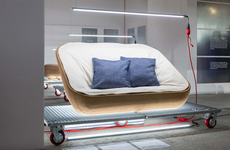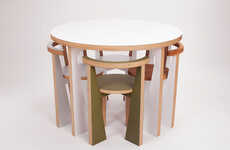
Haddy Emphasizes Advanced Technology and Sustainability
References: haddy.life
Haddy is a 3D-printed furniture manufacturer that combines advanced robotics and machine learning to produce durable, aesthetically pleasing furniture on a global scale. The company uses a variety of materials including wood, marble, leather, and metal, as well as a reusable composite to emphasize the importance of sustainability in production. By utilizing microfactories, strategically located near high-volume distribution areas, the company aims to address supply chain issues while creating local job opportunities.
Consumers would be attracted to Haddy as a 3D-printed furniture manufacturer because of the company's ability to produce high-quality, customizable furniture quickly and sustainably. The emphasis on 3D printing allows for unique designs, rapid prototyping, and efficient production.
Haddy spotlights some of its recent products on its website — from the Haddy Collection to the Retailer Room and Board.
Image Credit: Haddy
Consumers would be attracted to Haddy as a 3D-printed furniture manufacturer because of the company's ability to produce high-quality, customizable furniture quickly and sustainably. The emphasis on 3D printing allows for unique designs, rapid prototyping, and efficient production.
Haddy spotlights some of its recent products on its website — from the Haddy Collection to the Retailer Room and Board.
Image Credit: Haddy
Trend Themes
1. 3d-printed Furniture Customization - The ability to rapidly prototype and customize designs caters to consumer demand for personalized home and work environments.
2. Sustainable Material Innovation - Using a reusable composite and diverse materials like wood and metal, the push for eco-friendly production is reshaping the furniture industry landscape.
3. Localized Microfactory Production - Strategically placed microfactories optimize the supply chain by reducing transportation costs and supporting local economies.
Industry Implications
1. Furniture Manufacturing - Revolutionizing production techniques through 3D printing opens avenues for reduced waste and increased efficiency in furniture manufacturing.
2. Robotics and Machine Learning - The integration of advanced robotics and AI in furniture production enhances precision in manufacturing processes and product quality.
3. Sustainable Consumer Goods - Aligning with rising consumer preference for sustainable goods, this industry focuses on eco-conscious materials and practices.
5.8
Score
Popularity
Activity
Freshness























